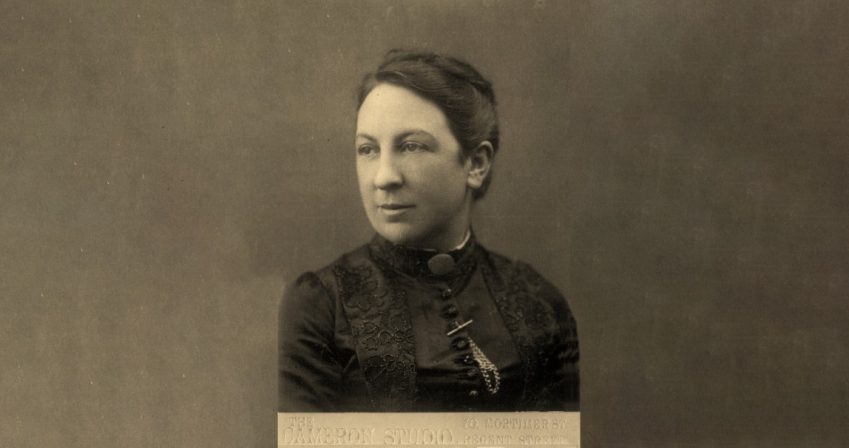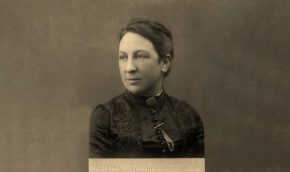First woman to earn a law degree
Women in Law
- Introduction
- Timeline
- Joyce Bamford-Addo
- Marion Billson
- Jill Black
- Elizabeth Butler-Sloss
- Eugenia Charles
- Lynda Clark
- Freda Corbet
- Coomee Rustom Dantra
- Leeona Dorrian
- Heather Hallett
- Frene Ginwala
- Rosalyn Higgins
- Daw Phar Hmee
- Lim Beng Hong
- Dorothy Knight Dix
- Sara Lawson
- Elizabeth Lane
- Theodora Llewelyn Davies
- Gladys Ramsarran
- Lucy See
- Evelyn Sharp
- Victoria Sharp
- Ingrid Simler
- Teo Soon Kim
- Ivy Williams
- The Significance of the Sex Disqualification (Removal) Act 1919
- Podcasts
Home › Women in Law › Pioneering Women in Law › Eliza Orme
Eliza Orme
1848 – 1937
Eliza Orme was the first woman in England to earn a law degree: in 1888 at University College London (UCL). She was then 39 years old and since her early twenties had been a prominent advocate for women’s suffrage and for the Women’s Liberal Federation (WLF). She was fully established in the career that would flourish for another two decades.
Rebuffed after an initial attempt to enter one of the Inns of Court, Orme opted instead to trade on the knowledge and mindset inculcated by an academic legal education to offer a new kind of professional service. She opened chambers in Chancery Lane and found clients among London’s busy barristers and solicitors, who paid her half the large fees they received from their own clients to prepare necessary documents.


Eliza Orme
Orme was the daughter of a prosperous distiller and a political activist; both parents were acquainted with literary and political figures and her mother a leader in the nascent women’s suffrage movement. Eliza Orme was one of nine women who, in 1869, sat the first General Examination for Women at UCL.
At the age of 23 she declared her intention to study law – because women clients needed legal advocacy, and because this was a lucrative profession that ought to be open to women.
An attempt to become the pupil of a sympathetic barrister at Lincoln’s Inn, with an eye to being called to the Bar as a conveyancer, was unsuccessful. Instead, in 1875, she established her own chambers in Chancery Lane in partnership with fellow UCL student Mary Richardson. Later another law student, Reina Emily Lawrence, joined her. This arrangement was successful, since there were plenty of clients for their service of preparing the paperwork for property transactions, wills, and mortgages. Patent agency and probate settlements were unregulated and therefore available to non-solicitors. In a 1903 interview with the Law Journal, Orme recalled: ‘I “devilled” for about a dozen conveyancing counsel who kept me busily employed on drafts they wanted done in a hurry, and for twenty-five years I found it both an interesting and profitable employment’. This interview, occasioned by Gwynneth Bebb’s (unsuccessful) challenge to the Benchers of Gray’s Inn, came at a time when Orme was already nearing retirement.
Although Eliza Orme was a feminist, her feminism came second to her Liberal party politics. In the mid-1880s she became a leader and spokesperson in the WLF. But that organisation split in 1892 over the question of whether it should endorse women’s suffrage in defiance of official party policy. Orme was one of those who formed the Women’s National Liberal Association, remaining in accord with the party establishment and Gladstone’s leadership.
Her feminism, like her Liberalism, was rooted in the belief that financial independence was the most important goal for women, whether they were married or single, working-class or prosperous.
Orme’s circumspect prominence in Chancery Lane and in Liberal Party circles led to a couple of significant opportunities to contribute to public policy. In 1892 she became Senior Lady Assistant Commissioner to the Royal Commission on Labour; her particular areas of investigation were the working conditions of barmaids, women in the metal industries, and women’s work in Ireland. And in 1894 she was invited to join a Departmental Committee on Prison Conditions chaired by a Member of Parliament.
In the closing decades of the 19th century, women like Eliza Orme LLB, her lifelong friend Reina Lawrence LLB, and her first partner Mary Richardson LLB, were not in a position to challenge the Inns of Court or the Law Society that regulated the credentials for barristers and solicitors respectively. Women in the United States, Canada, and elsewhere were already qualified lawyers, but in England the profession remained resolute in excluding them. The study of law in university – historic traditions, jurisprudence, and other academic subjects – allowed Orme to claim expertise. What she actually offered was reliable knowledge of practical matters, and proficiency in executing the work that entailed.
Leslie Howsam FRSC
Emerita Distinguished University Professor, University of Windsor, Canada
Senior Research Fellow, Centre for Digital Humanities, Ryerson University
References:
Howsam, Leslie. ‘Legal paperwork and public policy in late-Victorian Britain: Eliza Orme’s Professional Expertise’, in Precarious Professionals: Gender, Identity, and Social Change in Modern Britain, edited by Heidi Egginton and Zoë Thomas (London: Royal Historical Society / Institute of Historical Research New Historical Perspectives series, forthcoming 2020).
Mossman, Mary Jane. The First Women Lawyers: A Comparative Study of Gender, Law and the Legal Professions (Oxford: Hart Publishing, 2006): 121-153.